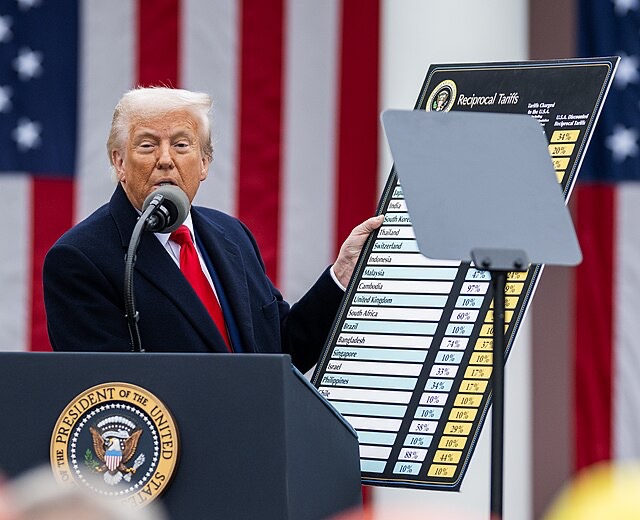A federal court delivered a devastating blow to President Trump’s trade agenda Wednesday, ruling that the vast majority of his tariffs are illegal and exceed his presidential authority, triggering relief in global markets and celebrations among U.S. businesses.
A three-judge panel at the U.S. Court of International Trade (USCIT) in New York ruled that Trump overstepped his authority by implementing a tariff regime on dozens of countries in a bid to enliven domestic manufacturing and to slash budget deficits by generating revenue from import levies.
The sweeping decision invalidates most tariffs imposed since Trump took office, including his signature “Liberation Day” tariffs announced on April 2 and separate levies on China, Canada, and Mexico justified as combating drug trafficking.
Market Reaction
Global markets rallied on the news. The ruling created immediate uncertainty for businesses and trading partners who have been navigating Trump’s volatile trade policies, though the administration immediately filed an appeal.
Court’s Reasoning
The court found that Trump’s use of the International Emergency Economic Powers Act (IEEPA) to impose tariffs was unauthorized and unconstitutional. Because of the Constitution’s express allocation of the tariff power to Congress…we do not read IEEPA to delegate an unbounded tariff authority to the President,” the court wrote.
IEEPA, the law at the heart of the case, had never been used to impose tariffs until President Trump did so. The 1977 law gives presidents broad economic powers during national emergencies, but the court ruled it doesn’t extend to unilateral tariff-making.
What’s Blocked
The ruling blocks:
- Trump’s 30% tariffs on China, his 25% tariffs on some goods imported from Mexico and Canada, and the 10% universal tariffs on most goods coming into the United States
- The worldwide “reciprocal” tariffs Trump announced as part of his “Liberation Day” initiative
However, it does not affect the 25% tariffs on autos, auto parts, steel or aluminum, which were subject to Section 232 of the Trade Expansion Act – a different law than the one Trump cited for his broader trade actions.
White House Response
The administration immediately pushed back against the ruling. It is not for unelected judges to decide how to properly address a national emergency,” White House spokesman Kush Desai said in a statement.
White House deputy chief of staff Stephen Miller said on X, “The judicial coup is out of control.”
Legal Challenge Origins
The ruling came in response to two separate lawsuits:
- The lawsuit was filed by the libertarian legal advocacy group Liberty Justice Center in April and represented wine-seller VOS Selections and four other small businesses that claimed they had been severely harmed by the tariffs
- Separately, and using similar arguments, twelve Democratic states sued the administration in the same court for “illegally imposing” tax hikes on Americans through the tariffs
Democratic state attorneys general celebrated the victory. Oregon Attorney General Dan Rayfield, a Democrat whose office is leading the states’ lawsuit, called Trump’s tariffs unlawful, reckless and economically devastating. This ruling reaffirms that our laws matter, and that trade decisions can’t be made on the president’s whim,” Rayfield said in a statement.
Gregory Meeks, the ranking Democrat on the House Foreign Affairs Committee who co-led an amicus brief in support of the 12 plaintiff states in the case, said in a statement: “I’m encouraged by the court’s decision today to block President Trump’s so-called ‘liberation day’ tariffs, confirming what we’ve long known: these tariffs are an illegal abuse of executive power.
Implications for Trade Policy
Without the instant leverage provided by tariffs, the Trump administration would have to find new forms of leverage or take a slower approach to negotiations with trading partners.
“[It] gives foreign governments — once compelled to negotiate new terms of the trade agreements the Trump administration broke — significant new leverage in ongoing trade talks,” said Scott Lincicome, vice president of the Cato Institute’s Stiefel Center for Trade Policy Studies, in a statement.
What Happens Next
The Court of International Trade ruled Wednesday that President Donald Trump exceeded his authority in imposing tariffs on all imported goods, calling an immediate halt to his signature trade war policy. The challenged Tariff Orders will be vacated and their operation permanently enjoined,” a three-judge panel ruled.
The administration has already filed an appeal to the U.S. Court of Appeals for the Federal Circuit, where they can request a stay of the order. The case could potentially reach the Supreme Court.
The Trump administration was given 10 days to make the necessary changes to carry out the judges’ orders.
Bipartisan Panel
Notably, the judges on the Manhattan panel were each appointed by a different president. Judge Jane Restani was appointed to the US Court of International Trade by President Ronald Reagan. Judge Gary Katzmann was appointed to the court by President Barack Obama. Judge Timothy Reif was appointed by President Trump.
This bipartisan composition of the panel that reached a unanimous decision adds weight to the ruling’s credibility and may complicate attempts to paint it as politically motivated.
The ruling represents a fundamental challenge to Trump’s trade strategy and could force a complete recalibration of U.S. trade policy if upheld on appeal.



